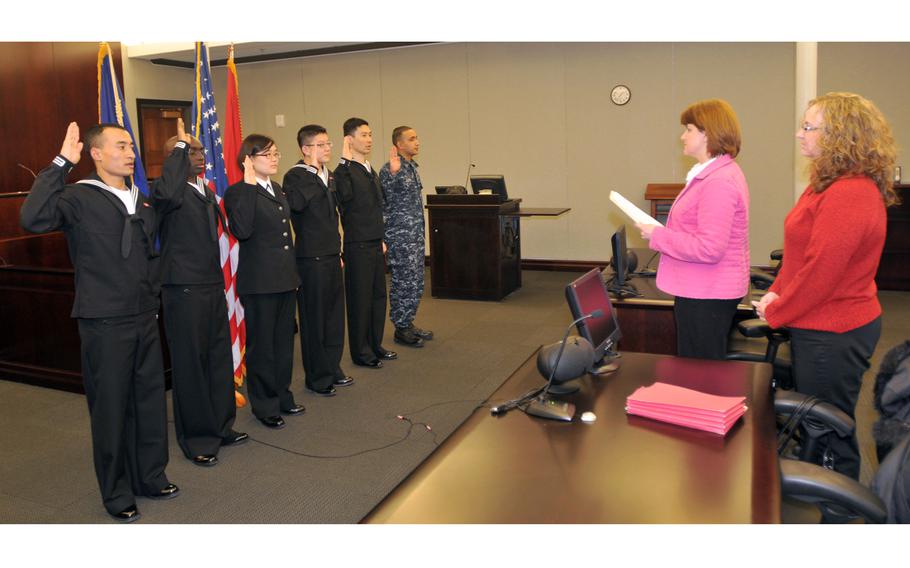
The first Navy sailors to participate in the Secretary of Defense’s Military Accessions Vital to National Interest pilot program are issued the oath of citizenship by Stacey Summers, branch chief from the U.S. Citizenship and Immigration Services Chicago field office, in 2010. (Scott Thornbloom/U.S. Navy)
Born and raised in a Himalayan valley, Saral Shrestha came from Nepal to school in the United States at age 17. At 24, he won the U.S. Army’s Best Warrior competition and became the Army’s Soldier of the Year. His Army enlistment was made possible by a Department of Defense program called the Military Accessions Vital to the National Interest, a recruiting program that allowed foreign-born individuals with critical skills to join the U.S. military.
The U.S. military is facing its greatest recruiting challenge since the inception of the volunteer service. The Army fell more than 15,000 soldiers short of its recruitment goal in Fiscal Year 2022. Foreign-born individuals wishing to join the military can fulfill urgent recruitment needs at a time when U.S. population growth is at its slowest and the interest in military service is near its lowest. The United States must create incentives for its foreign-born population to serve in the armed forces. Pathways such as MAVNI will close this critical gap by leveraging the talent of those who strongly believe in the American way of life and boosting U.S. military readiness.
It’s time to restore the MAVNI program.
Created during the George W. Bush administration, MAVNI enabled the recruitment of foreign-born, nonresident individuals legally in the United States. MAVNI targeted those non-citizens possessing skills vital to the U.S. military, such as fluency in Chinese or Russian and medical training. More than 10,000 foreign-born recruits have joined the military since its start in 2008, enlisting mostly in the Army.
Many MAVNI recruits became squad and platoon leaders, tended to stay in the service longer, scored about 20 points higher in entry tests, and had three to five years’ more education than U.S.-born recruits. Some MAVNI recruits graduated from universities such as Harvard and MIT.
The United States needs the MAVNI program today, now more than ever.
First, every branch of the U.S. armed forces is struggling to make its yearly recruitment goals. According to the Pentagon, 77% of young Americans do not qualify for military service due to insufficient education, physical and mental health challenges, or drug use. Leveraging its young foreign-born population will help the United States close this critical gap. Welcoming this population into the U.S. military is a win-win strategy that will instill a sense of patriotic duty in future Americans.
Second, foreign-born individuals possess the language, regional, and cultural skills vital to the U.S. military’s mission readiness. As the late Gen. Ray Odierno, former Army Chief of Staff, once said, “The best equipped Army in the world can still lose a war if it doesn’t understand the people it’s fighting.” The alternative to a MAVNI recruit is an estimated $62,000 to $215,000 spent per service member to learn these skills. Even after U.S.-born service members complete costly language training, they are unlikely to achieve the expertise level that foreign-born native speakers already possess.
Third, language skills will only become more important for the U.S. military in the era of great power competition. They matter both for operating on the ground with allies or for gathering intelligence against adversaries. Language proficiency will be particularly crucial for Special Forces operatives and foreign area officers working directly with partner nations. A reliable way to fulfill the need for foreign language proficiency is by recruiting native speakers in these career tracks. Programs such as MAVNI provide just that.
The MAVNI program was suspended in 2009 after Army Maj. Nidal Hasan killed 13 people and injured many more at Fort Hood, Texas. However, Hasan was born and raised in Arlington, Va., and had no connection to the MAVNI program. Later, the Trump administration suspended the program again over national security and insufficient vetting concerns. Several American-born recruits have been charged with terrorism, but no MAVNI recruit has ever been charged with terrorism. Some critics of the program say that recruits treated the program as a shortcut to U.S. citizenship. The low attrition rates of MAVNI recruits belie this claim.
The United States remains the only nation not bound by blood, geography or religion but by its commitment to liberty, equality and democracy. As such, it attracts the best and the brightest from all parts of the world. We must draw on this uniquely American advantage by recruiting talented foreign-born individuals like Saral Shrestha into our armed forces. We must restore MAVNI and create more pathways like it to sustain the greatest military force the world has ever seen. Leveraging our diverse population will ensure that the U.S. military remains the ultimate deterrent of war and the global guarantor of peace.
Yagmur Fitzwater is a graduate student in Security Policy Studies at George Washington University’s Elliott School of International Affairs.